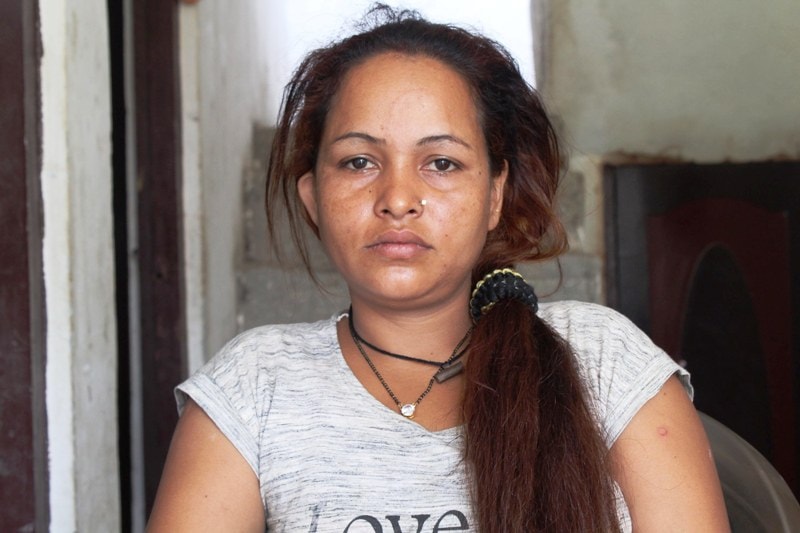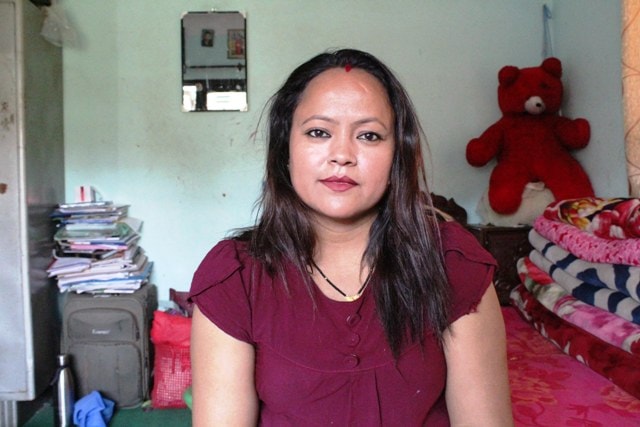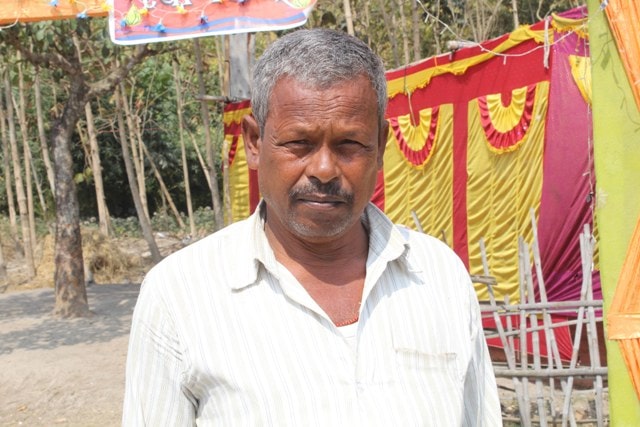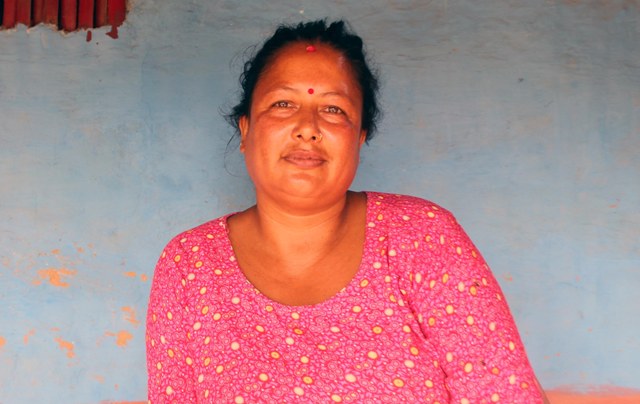Nepal was declared an untouchability-free nation 13 years ago but the social evil still prevails in personal and public domains. Some people’s representatives are also to blame.
Arjun Rajbanshi: Centre for Investigative Journalism-Nepal
A Shreemad Bhagwad Gyan Mahayagya was organized at the Tripurasundari Mai temple of Tauthali in Tripurasundari Rural Municipality-5, Sindhupalchok on 18-26 April, 2019. The religious event was managed by the ward unit of the local government. On the first day of the scripture recitation, most women of the ward participated in the Kalash Yatra. But elected ward members Anju Kapali and Balkumari Gadal were excluded from the procession for belonging to the so called “low caste”.

Sharada Baraili of Pathari Sanischare-8 is smeared in black for trying to recover her loan as an act of caste-based discrimination.
Two days before the procession, ward member Gadal had asked ward chairman Bishnubhakta Shrestha if she would be able to carry the holy water container. Shrestha had replied that other women would not participate in the procession if a Dalit woman went round carrying the Kalash. He added that Kalashes coming from Dalit households would be carried by girls of “upper caste” families. “We did not attend the procession after being told that low-caste [members] can’t carry the Kalash,” Kapali said.
Charging the people’s representative and the priest with caste-based discrimination, locals Mohan Kumar Kapali and Prem Bahadur Kusule filed a petition at the District Police Office demanding action against ward Chairman Bishnu Bhakta Shrestha, his daughter Pramila, priest Bhairav Shrestha and Pampha Shrestha, a local resident. After the incident became public, the petitioners felt social pressure to retract their application. An all-party meeting decided on April 28 not to practise caste-based discrimination any more.
Blackened for claiming money
A financial transaction between Sharada Baraili of Dolu Shukrabare in Pathari Sanischare Municipality Ward 8, Morang, and her neighbor Paras Limbu eventually led to an ethnic dispute. Of the money she lent four years ago, Sharada had to take back Rs 200,000 and its interest from Paras. Since Paras did not pay back the loan, Sharada not only reported the deal to police but also knocked on the door or the municipal judicial committee. Instead of repaying the money, Paras mistreated her.
Finally, an assembly was held in Sanischare on March 19. Among those meeting were municipal council member Gita Bishwokarma. The moment Sharada reached the meeting venue, some women supporting Paras Limbu not only verbally abused Sharada but also smeared her black. Gita says, “In course of the discussion, some women assaulted Sharada and smeared her with soot. I have no involvement in that.”
Gita is also accused of abetting the racial discrimination of Sharada. Immediately after the incident, police caught women including Gita but deputy mayor Yamuna Bista Bastola reached the Pathari Area Police Office to free Gita, Goma Khadka and Usha Limbu. Based on Sharada’s report, the police office filed charges against Gita, Paras Limbu, his wife Bimala, Phipharaj Limbu, his office Sharmila, Goma, Usha Limbu, Omarani Limbu, Yashoda Thapa, Chanchala Limbu and Omnath Bishwokarma. The accused have been freed on Rs 3,000 bail each.
“No Kami for the headmaster”
Even the headmaster is mistreated for belonging to the so called low caste. A victim of this social ill is Matrika Prasad Bishwokarma, head teacher at the Sangrumba Secondary School in Ilam Municipality-12. Having 22 teachers’ posts at present, the school had only one sanctioned post of secondary teacher until 2015. Temporary basic level teacher Mitra Prasad Bhattarai used to head the school. Secondary teacher Matrika Prasad was transferred to the school on May 3, 2015.

Damak Municipality Ward 9 member Mina Bishwokarma. The Bindyabasini Kirtan Mandali of her area does not sing hymns at the houses of Dalit communities.
Since the school is secondary, he filed an application as senior teacher at the District Education Office Ilam and the School Management Committee claiming the headmaster’s post. Since it was not heeded, he knocked on the court’s door. He became the headmaster with the court’s order but this upset some members of the committee. Nearly a year later, some teachers and guardians abused Bishwokarma saying “we won’t accept a Kami as headmaster”.
The Ilam District Police Office refused to register his complaint that he had been a victim of caste-based discrimination. On July 18, 2016, he reported the case to the National Dalit Commission, with whose help he filed a case at the district court on July 22. The court slapped a fine of Rs 1,000 to each of school management committee members Bharat Kumar Ghimire, Bhanubhakta Ghimire, Punya Prasad Ghimire and Bhawani Ghimire, convicting them of practising caste-based discrimination and untouchability. Bhanubhakta Ghimire is currently the elected ward member of Ilam Municipality-12.
Give money and refuse to eat
Ram Bahadur Bishwokarma of Shuddodhan Rural Municipality-4 in Rupandehi organized the wedding feast for his daughter Arati on April 18, 2019. Some of the non-Dalit invitees gave the bride ritual money (dakshina) but declined to eat the food there. Arati’s uncle Hom Bahadur Bishwokarma said: “We could not tolerate it when non-Dalit neighbours left the feast without eating one by one.”
According to Ram Bahadur, he returned the Rs 6,350 that the 22 non-Dalit guests had given to his daughter even if they ate no food there. He said that the food was catered by non-Dalit members in order to put the invitees at ease. Those refusing to eat were Nepali Congress regional member Keshav Adhikari, Mothers’ Group Chairperson Rasmaya Thapa, Tole Development Committee vice-chairman Balkrishna Gaire, Ashish KC, DR Kandel, Gokul Subedi, Krishna Prasad Bhandari, Gita Khanal, Chitra Bahadur KC and Indira Dotel, among others.

Chhatpati Majhi of Shivasatakshi Municipality-4 in Panchgachhi, Jhapa, got people belonging to the so called upper caste to cook food for his guests from Rajbanshi and Tajpuriya communities at his son’s wedding party.
Following the incident, the rural municipality’s judicial committee held a discussion at the initiative of RM Chairman Kisun Chandra Chaudhary, Vice-chairperson Shanti Devi Gyawali and Ward Chairman Rajendra Kandel, among others, with an aim to maintain social harmony.
Not all of those who declined the feast attended the discussion. Some of those who participated presented the excuses of having been fasting or having been in a hurry for the refusal to eat. The rural municipality then organized a feast for all in which legislatures, rural municipality representatives, local intellectuals, Dalits and non-Dalits ate food together. They also used the occasion to declare an end to caste-based discrimination in the local unit.
Not only Dalits and non-Dalits, everyone does not take wedding feasts easy. For instance, Chhatpati Majhi of Shivasatakshi Municipality-4 in Panchgachhi, Jhapa, had invited 150 households to the wedding of his son Amarlal on March 13, 2019. Among the invitees were 30 Rajbanshi households and 5 of Tajpuriya. Rajbanshi and Tajpuriya consider Majhi an inferior caste.
Jhatpati Majhi says: “As they said they would not eat the food cooked by us, I entrusted people belonging to upper caste with kitchen work. Only then did they eat at the wedding feast at my home.” Rajbanshis and Tajpuriyas not only refrain from eating at the houses of Santhal and Majhi, they use separate kitchen to feed members of the castes when they eat at their home.
Some more cases
Six years ago, hotel owner Bahranasi Sah drove out Sikendra Mallik, who had entered his hotel in Damak, Jhapa six years ago for snacks. He chided the “Doms” not to come into his hotel. After shouting slogans against the incident in Damak, the Dom community filed a public case against the hotel operator in the district court. “They still look down upon us in society as low caste. We have no problem with those who don’t know us as Dom. Those who know us discriminate in some ways,” says Sikendra.
There is a hymn group called Bindyabasini Kirtan Mandali of 30 households established five years ago at Campus Mode of Damak Municipality-9, Jhapa. The group sings devotional songs from 7 to 9 pm every Friday at the house of one of its members. Ten households of the area belong to the Dalit community. But the group sings only at the house of Rajendra Diyali.

Executive member Gita Bishwokarma of Pathari Sanischare Municipality in Morang, who was charged with inciting opponents to smear Sharada Baraili in black. Pictures: Arjun Rajbanshi
While forming the group, there was an agreement to sing at the house of all members in turn. Dalit members would also join the choir. The family hosting the event offers tea or juice to the participants. But the non-Dalit members move away for drinking the tea when it is offered. They pull the rug under them to be separated from Dalits. Non-Dalit members are asked to pick glasses from the tray but Dalits are given individual glasses so that they cannot touch other glasses. Town council member Mina Bishwokarma says: “I stopped going to the service due to such discrimination.”
Nepal was declared an untouchability-free nation on June 4, 2006. However, the social evil is in practice 13 years on. District Coordination Committee Chairman Somnath Portel says: “Dalits are still unable to eat at the house of non-Dalits comfortably. Extreme untouchability can be seen in weddings and funeral rites.”
The Constitution of Nepal lists rights against untouchability and discrimination in Article 24 as a fundamental right. The Caste Based Discrimination and Untouchability (Offence and Punishment) Act (2011) provisions that no individual may be deprived of public services on the basis of practice, tradition, religion, culture, ritual, caste, race, descent, community and profession. Any one convicted of practising racial discrimination and untouchability may be jailed from three months to three years or fined Rs 25,000 or both.
The Act provisions 50 per cent more punishment for a public position holder guilty of such crime. But there are few cases of public post holders punished for caste-based discrimination. Min Bishwokarma, central chairman of Nepal Dalit Association and former minister, says: “It’s unfortunate that the Caste Based Discrimination and Untouchability (Offence and Punishment) Act (2011) has not been implemented effectively. The country has been declared an untouchability-free nation but untouchability remains intact—it is severer in some cases.”



